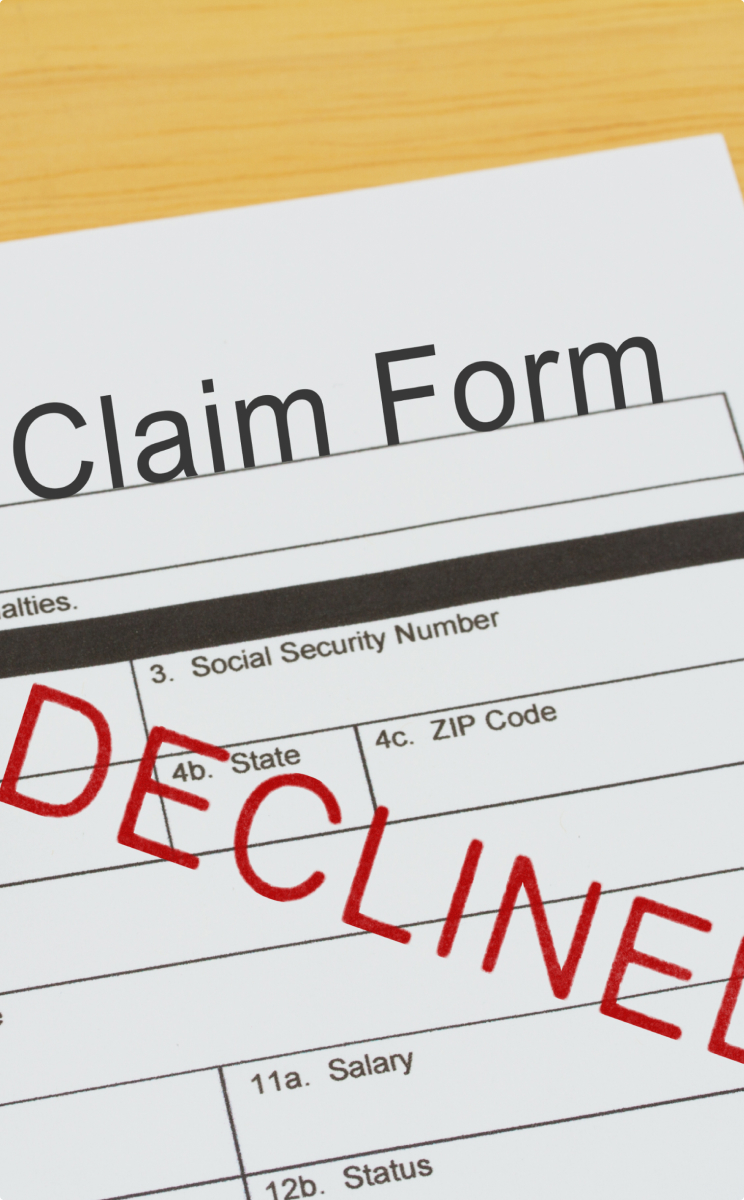North Carolina workers'
compensation attorneys
At the DeMayo Law Offices, Your North Carolina Law Firm™, we are passionate about helping people who were injured at work and their families receive the appropriate level of compensation from a work-related injury to cover the costs of medical expenses and daily living.
Even when legitimate claims are denied, we won’t stop fighting for you and will work to appeal.
Contact our North and South Carolina Workers’ compensation law firm to learn more. We would be proud to represent you and your workers’ compensation claim.

For a free legal consultation with a workers' compensation lawyer serving North Carolina, call (877) 333-1000
What’s covered by workers’ compensation
Workers’ compensation reimburses medical expenses (past, present, and future) as well as any related lost wages. It doesn’t cover non-economic damages like pain and suffering, mental anguish, etc. When injured workers collect workers’ compensation, they are no longer entitled to seek compensation from their employer through a personal injury claim.
However, it’s possible that an injured worker or surviving family member may be able to sue a third party whose negligence contributed directly to the injury or death. A third party, for example, is not the immediate employer but could be an equipment manufacturer or other business associated with the employment.
You may find that the workers’ compensation you receive for your injury or illness is much less than you were expecting or doesn’t cover your expenses. It’s important to contact an experienced injury law firm should this circumstance arise. A workers’ compensation attorney will work with the employer and their insurance company to ensure benefits for the worker.
Have you been injured on the job? Call (866) 205-5181 to schedule a free consultation or tell us about the accident online.
Occupational diseases covered by workers’ compensation
Certain medical conditions are specifically identified as workplace exposure diseases and are listed in North Carolina General Statute 97-53. These include:
-
Asbestosis
-
Anthrax
-
Mercury poisoning
-
Radium poisoning due to radiation exposure
-
Hearing loss caused by workplace noise
-
Bursitis
-
Miner’s nystagmus
-
Undulant fever
-
Compressed air illness
-
Sulfuric, hydrochloric, or hydroflouric acid poisoning
-
Carbon monoxide poisoning
-
Certain cases of lead poisoning
-
Manganese poisoning
-
Zinc poisoning
-
Brass poisoning
-
Phosphorus poisoning
-
Epitheliomas cancer
-
Benzol poisoning
-
Blisters caused by pressure or use of tools during employment
-
Synovitis and tenosynovitis
-
Bone felon caused by pressure
-
Silicosis
-
Psittacosis
-
Smallpox infection from vaccinations
-
Diseases caused by exposure to chemicals
If an employee has developed one of these conditions, it is presumed that the workplace increased their risk of developing the disease.
Step 1. Notify your employer right away.
Notify your employer in an email or letter explaining what happened, and be sure to keep a copy for yourself. If you’ve already reported the injury orally, make a note of the date, the time, the name of the person you talked to, their position in the company, and their exact response. Then, follow up with a written letter to the employer confirming the oral report. The sooner you have something in writing, the better.
This step is crucial, as claims are often denied because the injured worker waited too long to report the injury. Insurance companies are frequently unwilling to issue payment for accidents that weren’t reported right away. However, if some time has passed since the injury and you haven’t made a report, please don’t assume that it’s too late. Go ahead and notify your employer anyway. Time matters.
Step 2. File necessary paperwork.
In North Carolina, Workers’ Compensation is handled by the N.C. Industrial Commission. Employees have a responsibility to file a claim with the Commission soon after being hurt at work. Failure to do so in a timely manner can cause you to permanently lose your rights to compensation under the system.
The workers’ compensation claims process can be very confusing and frustrating. There are important time limits that govern your ability to file a workers’ compensation claim. If you need help with filing a claim after being hurt at work or would like to speak to someone about the process of making a workers’ compensation claim please contact our office by calling our toll free number (866) 205-5181.
North Carolina Workers' Compensation Lawyer Near Me (877) 333-1000
Step 3. Seek medical attention as soon as possible.
If your workplace accident caused severe or life-threatening injuries, you may have already been rushed to an emergency room for urgent medical care. Otherwise, you’ll need to arrange for medical attention on your own.
Do not assume that you can diagnose the extent of your injuries on your own. Often, pain and complications may not occur until after an accident has happened; a doctor will be able to determine the true nature of your workplace injuries and the treatment(s) necessary for your recovery.
Documented doctor’s visits are very important to your workers’ compensation claim as they are evidence of your injuries. By visiting a doctor and getting treatment for your workplace injury, you are able to take the necessary steps to get yourself better while creating an accurate record of your workplace injuries.
Step 4. Contact a North Carolina workplace injury attorney.
Workplace injury victims often misunderstand their rights under the North Carolina Workers’ Compensation system. Claims are often unfairly reduced or denied because injured parties may not have realized what they are entitled to under the laws of North Carolina workers’ compensation system.
Working with a workers’ comp attorney will ensure that you understand your case and your legal rights. Your lawyers can handle all of the complications for you, taking the headache and hassle out of your workers’ compensation case. Your employer and their insurance company have lawyers working for them. Having an experienced workers’ compensation lawyer on your side can help you make sure that your rights are protected.
What happens if a claim is denied?
There are several reasons a legitimate claim could be denied or limited. The most common reason is that injured workers fail to meet the state deadlines for filing or forms aren’t correctly completed.
Other reasons a claim could be denied include:
- Missing forms or documentation
- Lack of credible evidence (i.e. medical records, witness testimony, etc.)
- Disputes with the employer or insurance company
- The injury isn’t severe enough to qualify
In North Carolina, any injury or illness must be reported orally and in writing to the employer within 30 days of the accident. Workers must also formally file the claim (Form 18) with the North Carolina Industrial Commission. This form establishes a legal injury claim on the victim’s behalf and must be filed within two years of the injury.
In South Carolina, you must report a work-related accident to your employer within ninety (90) days; however, it is best to report your injury to your employer as soon as possible, so there is no confusion about what happened or when it occurred. To file a claim, an injured worker (or dependent) must complete Form 50 (workplace injury claim) or Form 52 (workplace death claim) and submit it to the S.C. Workers’ Compensation Commission before the 2- year deadline.
If you receive a letter from the Commission denying the claim, note the appeal deadline, and contact a workers’ compensation law firm immediately.
To appeal the decision, you must first notify the North Carolina Industrial Commission or the South Carolina Workers’ Compensation Commission, as the case may be, of your intent to appeal within 14 days of the denial. You will attend a mediation conference with your workers’ compensation lawyer, and the mediator will make a recommendation based on the evidence in your claim.
The appeal process will start with a hearing with a judge, which will require organization and evidence gathering to ensure a fair outcome. Presenting detailed medical records, medical bills, and other evidence can be key to your success at this step. Having a workers’ compensation attorney experienced with workers’ compensation appeals is very important, as the process can be complex.

Workers’ compensation laws are complex, but you don’t have to fight for the benefits you deserve alone.
With convenient locations throughout North and South Carolina, the DeMayo Law Offices workers’ comp lawyers are dedicated to helping injured workers maximize their benefits.
Click to contact our North Carolina Personal Injury Lawyers today
FAQs: Concerning Workers’ Compensation
Workers’ compensation is a state-required insurance program required for employers with 3 or more employees to compensate employees who are injured or who get ill from work-related incidents. Workers’ compensation is a system that pays for medical costs and lost wages resulting from work-related injury or illness. Employees who benefit from workers’ compensation are not allowed to sue their employer for negligence.
Nearly all work-related injuries are covered under workers’ compensation, regardless of who caused the injury. Also, you do not have to prove negligence or liability if you are injured and want to receive workers’ compensation.
If your injury is the result of a self-inflicted incident, a crime you were committing, or if the injury occurred because of conduct that violates company policy, workers’ compensation may not cover the resulting costs or lost wages.
No. Workers’ compensation can cover the cost of the injury or any lost work if you sustain an injury like carpal tunnel syndrome due to continued use or misuse. However, proving that your injuries are the direct result of your employment may be difficult. If you would like to receive workers’ compensation, contact DeMayo Law Offices as soon as possible. Our workers’ compensation lawyers may be able to help you.
In North Carolina, you must wait seven days after your injury before you start receiving benefits, unless your disability lasts for at least 21 days. If you miss 8 to 21 days of work, you will receive benefits for those days. If you miss more than 21 days of work, you will receive benefits for the entire time, including the first week of your injury. The compensation rate for wage benefits is two-thirds of your average weekly wage (AWW). Medical benefits are paid immediately following the injury, with no waiting period. In South Carolina, you are entitled to temporarily lost pay if you are entirely laid off for longer than 7 days (or temporary compensation). The eighth calendar day after your inability to work is when you become eligible to start collecting temporary pay. You are eligible to receive benefits beginning on the first day of your incapacity if you are entirely off the job for more than 14 days.
There is no time limit in North Carolina for injuries that occurred before June 24, 2011. For workers’ compensation cases after this date, benefits can continue for up to 500 weeks, with a possible extension in certain circumstances. Benefits stop when you return to work or when your employer files an ‘Application to Terminate Benefits’ with N.C. Industrial Commission.
In South Carolina, you should receive interim compensation payments until you are fully cleared to return to work without any restrictions. The employer’s representative will send you two copies of Form 15 with Section II completed informing you that your payments have been discontinued and why you are allowed to return to work within 150 days of being notified of the accident.
Fill out Section III of the form to request a hearing if you disagree that your payments should stop, and send it to the Commission’s Judicial Department.
Your employer has the first opportunity to choose the doctor who treats you. You may request a change in doctors from the Industrial Commission if you can show that a change is necessary to cure your condition or help you return to work. You may also ask another doctor for a second opinion on your injury.
In South Carolina, your employer has the authority to select your treating physician. If you seek treatment from any doctor of your choosing, your employer’s representative may refuse to pay your medical bills for work-related injuries. As a result, you must request that your employer refer you to a doctor of their choosing. Do not assume the referral was approved if your injury necessitated emergency treatment and the emergency room referred you for follow-up care.
Certain mental health conditions may be eligible for workers’ compensation benefits if they arise from your employment. North Carolina workers’ comp laws are relatively restrictive in this respect. You must be able to prove that you developed a mental condition, such as anxiety or depression, as a result of a specific workplace accident. The general stress you experience in your everyday job would not count, even if it caused you to develop a mental condition.
If the death is related to a workplace injury or a disease acquired in the course of employment, you may be able to collect compensation if it is within six years of the date of injury or onset of disability, or within two years from a final determination of disability. You should discuss this situation with an experienced workers’ compensation attorney.
Certain employees are not eligible for workers’ compensation under North Carolina law. These include casual employees who don’t work regular hours, domestic or household employees, farmworkers on farms with fewer than ten employees, certain railroad employees, and federal government employees. Federal employees are covered under the Federal Employees’ Compensation Act.
It is possible to receive benefits if your employment exposes you to COVID-19. You must prove that your work exposed you to a greater risk than the general public and that your job exposed you to the disease. To establish an injury by accident claim, you must show that you contracted COVID-19 due to an accident arising from your employment.
No, but there are situations where you may be able to sue your employer for gross negligence, for instance, if they do not offer workers’ comp benefits. Some legal loopholes may let you file a lawsuit. Your employer may tell you that you can’t sue, so it’s a good idea to speak to one of the workers’ compensation attorneys at DeMayo Law Offices to learn more about your options.
With this in mind, here are some rare scenarios where you could sue your employer.
- If you believe a coworker, manager, or employer hurt you. This doesn’t happen often, but it is a possibility. This situation can include slander, invasion of privacy, assault, rape, and deliberately causing emotional distress. Since these attacks can cause physical and emotional harm, you may be able to file an intentional tort lawsuit.
- If a third party injured you. If your injury was caused by faulty products or equipment, you could file a product liability lawsuit against the manufacturer, retailer, or distributor. For instance, if you were using scaffolding that broke, causing you to fall, the manufacturer could be liable. Because a third party’s negligence caused the accident, you can sue even if you’re receiving workers’ compensation benefits. However, if you win a product liability lawsuit, your employer may ask for reimbursement for the money spent on your workers’ comp claims.
- If your workers’ comp benefits were denied or taken away for no reason. While this is a valid lawsuit, it requires an extensive amount of work for you and your attorney. Many requirements have to be met before your case will go to trial. Each state deals with this situation differently, so you should get in touch with a North or South Carolina worker’s compensation law office to learn what you should do if your workers’ comp benefits are denied.
What North and South Carolina workers need to know
Workers’ compensation functions like insurance – however, collecting these benefits prohibits workers from suing their employer for injuries. To receive workers’ compensation, you must be employed at the time of the injury, and the injury must result from whatever tasks are required.
This rule also extends to illnesses sustained while working (e.g., lung cancer or mesothelioma) and cumulative trauma such as carpal tunnel syndrome. Benefits can be provided temporarily while the injury heals or provided in perpetuity, depending on the circumstances.
Workers’ compensation claims are awarded based on strict liability: this means fault or negligence doesn’t have to be proven or assigned to a particular party in order to collect benefits.
All North Carolina employers who employ three or more workers must obtain workers’ compensation insurance or qualify as self-insured employers. If an employer fails to provide this coverage, they could face stiff financial penalties or be charged with a misdemeanor or felony and possibly imprisoned. All injured workers who qualify are entitled to workers’ compensation, and neglecting to provide these benefits is a criminal offense.
Contact DeMayo Law Offices in North or South Carolina
Do you have questions about a denied workers’ compensation claim? The North and South Carolina workers’ compensation attorneys at DeMayo Law Offices, Your North Carolina Law Firm™, are here to help. We can guide you through the process from start to finish, so that no detail is missed. The success of workers’ compensation claims often depends on providing accurate and complete information, according to strict deadlines.
Our firm has decades of experience helping clients obtain the compensation and benefits they deserve for their injuries.
We take pride in our ability to serve all our clients with personalized care and top-quality legal advice.
We have convenient office locations throughout North and South Carolina.
Call (866) 205-5181 to get started now.





